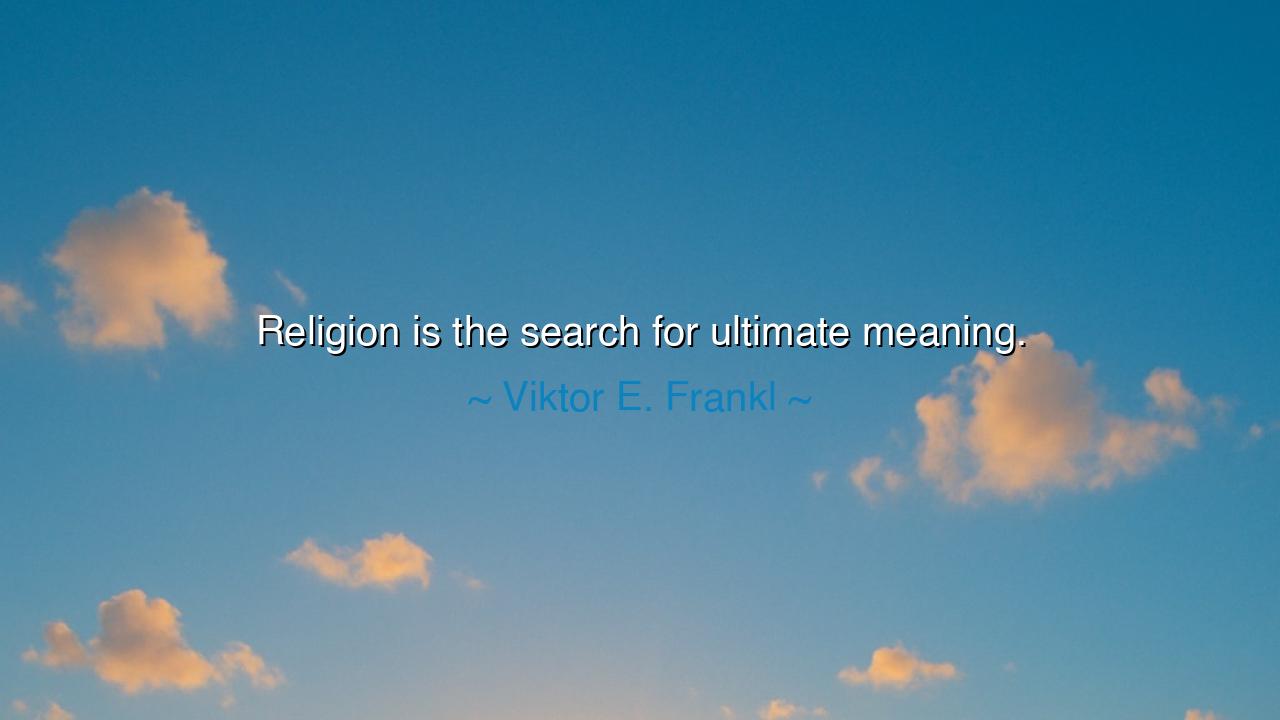
Religion is the search for ultimate meaning.






“Religion is the search for ultimate meaning.” – Viktor E. Frankl
In these quiet yet profound words, Viktor E. Frankl, the psychiatrist, philosopher, and survivor of the Holocaust, gives voice to one of the deepest truths of human existence. To him, religion was not merely a system of rituals or creeds, but the search for ultimate meaning—the longing that lives within every human soul to understand why we are here, and for what we suffer and strive. Frankl does not speak of religion as belonging to temples or doctrines, but as the movement of the heart toward the eternal. In his view, every act of love, every moment of courage, every question asked in the silence of despair, is a step upon the sacred path of this search.
The origin of this insight lies in Frankl’s own journey through unimaginable darkness. During his imprisonment in the Nazi concentration camps, stripped of freedom, family, and dignity, he saw that those who survived were not the strongest or the most intelligent, but those who could still find meaning—even in suffering. For them, life retained purpose because they could still love, still believe, still hope. When all else was taken, this search for ultimate meaning was the one treasure that could not be stolen. It was, in itself, a kind of religion: a faith not confined to scripture, but written upon the human spirit.
To search for meaning is to live as a seeker of truth, not as a mere wanderer through time. Many live without asking the deeper questions, content with comfort or distraction. But the one who truly seeks becomes aware that existence is not random, that behind every sorrow and joy lies something sacred waiting to be understood. In this sense, religion—whether named or unnamed—is the soul’s effort to connect the visible with the invisible, the finite with the infinite. It is not only belief in God; it is belief in purpose—that there is a reason for our being, even if we do not yet comprehend it.
Consider the example of Nelson Mandela, who, like Frankl, found meaning in the midst of captivity. Imprisoned for twenty-seven years, he could have surrendered to bitterness or despair. Yet he used his suffering to forge a new understanding of justice, forgiveness, and unity. In his solitude, he sought not revenge, but redemption for his people and himself. His endurance was not only political—it was spiritual. He, too, was guided by a search for ultimate meaning, one that transcended hatred and pointed toward reconciliation. In him we see that religion, in its truest sense, is not found in words but in the transformation of the heart.
Frankl’s words also remind us that meaning is not handed down like an inheritance—it must be discovered, often through struggle. The search is lifelong and sacred, demanding both courage and humility. At times, it is the search that keeps us alive. In moments of loss, we ask, “Why must this be?” and in the asking, we are already walking the religious path. For as Frankl wrote, “Those who have a why to live can bear almost any how.” To live religiously, therefore, is not necessarily to follow a specific faith, but to recognize that life itself is holy, and that every experience—painful or joyous—is a doorway to understanding the mystery of existence.
Yet this truth carries a challenge. For the search for ultimate meaning requires us to look beyond ourselves—to step out of comfort and into conscience, to serve something greater than our desires. It asks that we see our lives as threads in a vast tapestry whose pattern we cannot yet see. This awareness calls forth reverence: for the world, for others, for our brief time upon this earth. To live without this search is to live in emptiness; to live with it is to walk in light. Frankl teaches that man’s greatest dignity is his ability to find meaning even in the face of despair—to affirm that life is worth living, even when it seems cruel or unjust.
So, my child of reason and wonder, take this lesson deeply into your heart: seek your meaning, and never cease to seek. Do not expect it to arrive as revelation, but discover it in the quiet places—in your labor, your love, your suffering, your service. When the world confuses or wounds you, remember that even in the darkest night, the search itself is sacred. Every act of kindness, every moment of reflection, every attempt to create beauty or bring peace—these are prayers in the language of being.
For as Viktor Frankl teaches, to live is to search, and to search is to believe. Religion, then, is not the possession of truth, but the longing for it—the flame that drives the human spirit ever forward, reaching toward the divine meaning that gives all things their purpose. And when at last we find even a glimmer of that meaning, we will know that life, though full of suffering, is also full of grace.






AAdministratorAdministrator
Welcome, honored guests. Please leave a comment, we will respond soon